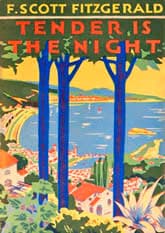Tender Is the Night
Critique • Quotes • At the movies
 First edition
First editionFirst publication
1934
Literature form
Novel
Genre
Literary
Writing language
English
Author's country
United States
Length
Approx. 119,500 words
Poor story, great novel
A tip for reading Tender Is the Night. Don't try it right after The Great Gatsby, even though it was Scott Fitzgerald's next novel. If you do, you'll be disappointed. The tight writing of Gatsby—with its unforgettable images, controlled perspective and brilliant plot—is gone.
However, if you read Tender Is the Night for its own very different charms you may find that it's also a great work by a novelist near the height of his powers. You may see it as the most mature work in Fitzgerald's non-Gatsby oeuvre, the best in the line that includes This Side of Paradise and The Beautiful and Damned.
The novel starts too slowly with a belaboured description of the Riviera beach and the well-to-do travellers who socialize with each other as they keep meeting at various European vacations spots. We follow the banal observations of 18-year-old Hollywood actress Rosemary Hoyt. Her mother encourages her to have an affair with fellow American Dick Diver, whose marriage with the beautiful Nicole seems perfect. The Divers are the social centre of the group.
But too many pages into Fitzgerald's longest novel, we discover all is not as it seems with the Divers. This is where the novel really starts. A long flashback shows the Divers' unusual relationship from the beginning when Nicole was a psychiatric patient and Dick the doctor. Now this is interesting.
The back story catches up to the present and passes it, as the dynamic between Dick and Nicole goes through changes. Eventually it settles into a resolution that is perhaps realistic but not very dramatic.
The novel suffers from lack of a climax. Without this to pull you through to the end, you are likely to become too aware that these characters are the semi-rich who can afford to be semi-idle and to suffer angst over affairs and social slights on Mediterranean yachts. I've heard variously Fitzgerald was writing about his own relationship with his wife Zelda or he was using another well-known couple in his circle as models. Perhaps his attempts to be true to the original material—and he does have a wonderful eye for picking out details that reveal character—hindered his ability to invent a more vital plot.
Uniquely gifted
Something I've never seen anyone else point out about Tender Is the Night is the seeming influence of Ernest Hemingway's writing, especially of The Sun Also Rises. Some of the obvious parallels of course are the lost generation-like ramblings of the American ex-pats around Europe seeking amusement, getting drunk, having affairs and so on, and the role of the woman at the centre (Brett Ashley/Nicole Diver) who remains loved by the male protagonist despite her capriciousness and unintentional cruelty.
But even some of Hemingway's writing style has been adapted. For example, note the paragraph in which Dick meets Nicole unexpectedly in another country after trying to avoid thinking of her:
In the compartment above and in front of Dick's, a group of English were standing up and exclaiming upon the backdrop of sky, when suddenly there was a confusion among them—they parted to give way to a couple of young people who made apologies and scrambled over into the rear compartment of the funicular—Dick's compartment. The young man was a Latin with the eyes of a stuffed deer; the girl was Nicole.
This trick of producing the woman, whose memory has haunted the man, in the last sentence of a paragraph that first seemed to be about something else is similar to Hemingway's introduction of Brett. (The passage is quoted in the commentary on The Sun Also Rises.) Fitzgerald has unabashedly discussed his stealing of other writer's tricks—which all serious writers engage in, to be honest—and this seems to be an effective example.
Still, Fitzgerald is a uniquely gifted writer. Note the very few words that neatly pin the young Latin's appearance in our minds. Almost every page of Tender Is the Night shows such evidence of author's fine eye and ear. And he writes with great perceptiveness about the nuances and gestures that signal small shifts in relations between individuals—with a facility that Hemingway had to work harder to approximate.
Plus there are those cinematic scenes that only Fitzgerald could reproduce in prose. The girls invading Nicole and her lover's hotel room to see their sailor boyfriends off from the balcony. Dick coming to the rescue of his superior sister-in-law who is thrown in jail for impersonating a man. The discovery and removal of an unknown dead man in the actress's bed.
One wonders what he could have made of Tender Is the Night with a real, overarching story.
— Eric
Critique • Quotes • At the movies

